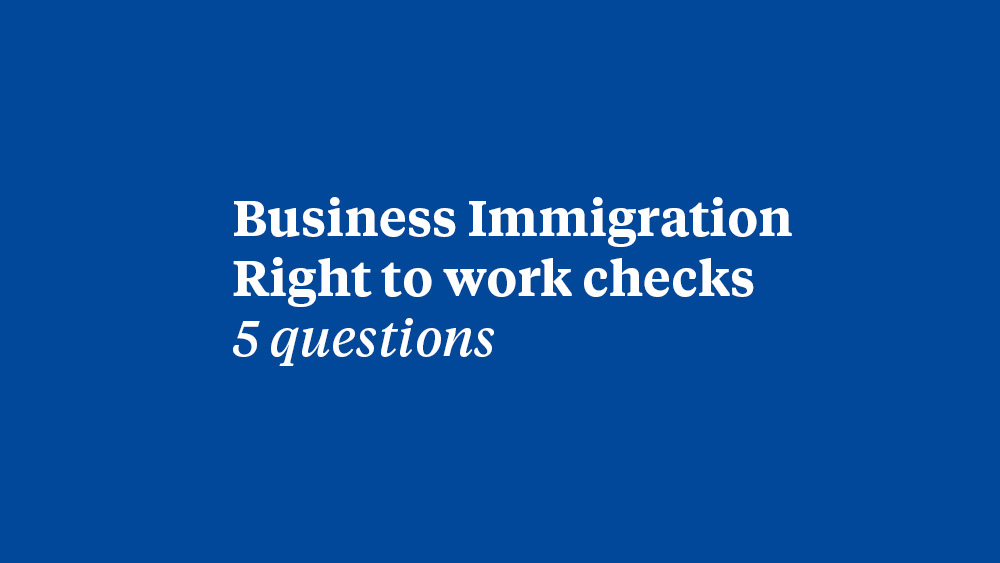5 questions our clients ask us most
Making sure employees have the right to work is a necessity for any business – yet complex and changing rules often create confusion. Here are five questions about right to work checks that our business immigration experts are most frequently asked – and their answers. We kept these short and to the point, so if you need more information or need a more specific question answered, get in touch.
1. How have the RTW checks changed?
For British and Irish Nationals
As the employer you are still responsible for carrying out a RTW check even if you are certain the employee has a right to work in the UK. Right to work checks must be carried out for all staff to avoid discrimination. Since 1 October 2022, you can use an Identity Service Provider (IDSP) to check passports for British and Irish nationals. You must still check that the output of the check (photograph and biographic details) matches the person presenting for work.
For Biometric Residence Permits, and those with status under the EUSS or a frontier worker permit, or those with an eVisa
You must do an online check, as since 6 April 2022 manual checks for permit or status holders are no longer accepted. The individual you seek to employ will need to give you a share code, which you will then use to check their identity and whether they have the right to work in the UK. As part of this you must also make sure that a photo of the person online is the same as the individual. This can be done via video call and does not have to be done in person.
For all other checks a manual check must be carried out.
2. What do I need to be aware of when employing international students?
International students can often work around their studies but they will be limited to 10-20 hours per week during term time (unlimited hours during vacation time). Employers will need to carry out an online check to verify this in the usual way, but they will also need to obtain and retain evidence of the students term and vacation dates so they don’t fall foul of the work restrictions. Evidence can include letters or emails from the education provider to the student or you as the employer.
3. What do I do if I find out an employee did not apply for status under the EU Settlement Scheme?
What is supplementary employment?
Certain sponsored workers including Skilled Workers can do up to 20 hours per week supplementary employment with another employer. There are strict rules around this. For example the supplementary work must take place outside the working hours of the sponsored role. Skilled workers are able to do supplementary employment in any role that is capable of sponsorship under the Skilled Worker route, but there are more limited opportunities for other visa holders. As the supplementary employer, you must obtain evidence that the supplementary employment meets these requirements for example by obtaining a letter from the employee or their sponsor confirming details of their sponsored role.
4. How do I carry out a check using the Employer Checking Service (ECS)?
When are ECS checks used?
These are used in a variety of situations – one of the most common is where an existing employee has applied to extend their visa and their new visa has not been approved before the date their old visa expired. Providing the employee made their visa application before their current visa expired, they will hold over on the terms of their old visa until their new visa is approved, even if this is after the expiry date of their old visa. This is known as 3C leave, and enables the employee to carry on working lawfully. As the employer, you will need to be satisfied that there is an extension visa application pending with the Home Office and you do this by performing an ECS check.
If the individual has the right to work in the UK
You should receive a Positive Verification Notice. You must keep a copy of this notice on file as this will be proof of the individual’s right to work for the next six months. You will need to set up a diary reminder to check whether the individual is still waiting for their application to be decided towards the end of that six months. If so, you must carry out another ECS check and (assuming the result is a Positive Verification Notice), keep a copy of the notice on file for another six months. This process continues until the employee’s application has been decided or you receive a Negative Verification Notice.
If the individual does not have the right to work in the UK
You will receive a Negative Verification Notice. In this case, you should take legal advice as you may need to end their employment.
5. What should I do if I need to carry out an online check or ECS check and the individual refuses to give me any information?
What should I do about employees I inherit following a TUPE transfer?
Under TUPE, the right to work checks carried out by the old employer (transferor) are deemed to be carried out by you as the new employer (transferee). However how can you be sure that the transferor did the right to work checks correctly? So that you are not penalised for any mistakes made by the transferor, the Home Office allows you a 60 day grace period from the date of the transfer to carry out your own fresh right to work checks, during which time you will have a statutory excuse against any civil penalty.
Please reach out to our business immigration team for information on fees and guidance.



